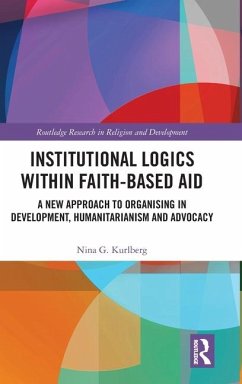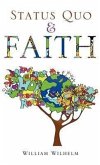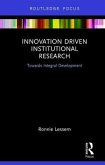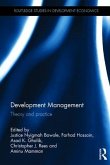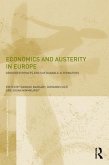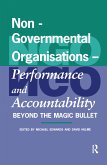Nina G Kurlberg
Institutional Logics within Faith-Based Aid
A New Approach to Organising in Development, Humanitarianism and Advocacy
Nina G Kurlberg
Institutional Logics within Faith-Based Aid
A New Approach to Organising in Development, Humanitarianism and Advocacy
- Gebundenes Buch
- Merkliste
- Auf die Merkliste
- Bewerten Bewerten
- Teilen
- Produkt teilen
- Produkterinnerung
- Produkterinnerung
This book investigates what faith means in the actual day-to-day practice of faith-based NGOs working in the development, humanitarian, and advocacy sectors.
Andere Kunden interessierten sich auch für
![Status Quo and Faith Status Quo and Faith]() William WilhelmStatus Quo and Faith22,99 €
William WilhelmStatus Quo and Faith22,99 €![Innovation Driven Institutional Research Innovation Driven Institutional Research]() Ronnie LessemInnovation Driven Institutional Research85,99 €
Ronnie LessemInnovation Driven Institutional Research85,99 €![The Free Person and the Free Economy The Free Person and the Free Economy]() Anthony J SantelliThe Free Person and the Free Economy129,99 €
Anthony J SantelliThe Free Person and the Free Economy129,99 €![Tools and the Man: Property and Industry Under the Christian Law Tools and the Man: Property and Industry Under the Christian Law]() Washington GladdenTools and the Man: Property and Industry Under the Christian Law38,99 €
Washington GladdenTools and the Man: Property and Industry Under the Christian Law38,99 €![Development Management Development Management]() Development Management197,99 €
Development Management197,99 €![Economics and Austerity in Europe Economics and Austerity in Europe]() Economics and Austerity in Europe64,99 €
Economics and Austerity in Europe64,99 €![Non-Governmental Organisations - Performance and Accountability Non-Governmental Organisations - Performance and Accountability]() Non-Governmental Organisations - Performance and Accountability197,99 €
Non-Governmental Organisations - Performance and Accountability197,99 €-
-
-
This book investigates what faith means in the actual day-to-day practice of faith-based NGOs working in the development, humanitarian, and advocacy sectors.
Hinweis: Dieser Artikel kann nur an eine deutsche Lieferadresse ausgeliefert werden.
Hinweis: Dieser Artikel kann nur an eine deutsche Lieferadresse ausgeliefert werden.
Produktdetails
- Produktdetails
- Verlag: Taylor & Francis
- Seitenzahl: 170
- Erscheinungstermin: 19. Juli 2024
- Englisch
- Abmessung: 234mm x 156mm x 13mm
- Gewicht: 440g
- ISBN-13: 9781032770086
- ISBN-10: 1032770082
- Artikelnr.: 70148589
- Verlag: Taylor & Francis
- Seitenzahl: 170
- Erscheinungstermin: 19. Juli 2024
- Englisch
- Abmessung: 234mm x 156mm x 13mm
- Gewicht: 440g
- ISBN-13: 9781032770086
- ISBN-10: 1032770082
- Artikelnr.: 70148589
Nina G. Kurlberg is Postdoctoral Research Associate at Durham University. In her PhD (University of Edinburgh, 2023), she used the lens of institutional logics to explore what the faith orientation of faith-based organisations means in actual practice. Nina has worked within the international development sector for nearly a decade, both in the UK and Sri Lanka. Most recently, she worked for Tearfund - a Christian relief, development, and advocacy organisation - developing theology in the area of diversity and inclusion (D&I). Nina is co-editor of Theologies and Practices of Inclusion and Disability Inclusion in Africa.
Introduction
Faith-Based Organisations (FBOs)
FBOs within religions and development
Understanding and researching FBOs
Roadmap to the institutional logics perspective
A critique of the existing frameworks
The institutional logics perspective
Overview of the book
Structure
Defining key terms
1 The institutional logics perspective in research
Theoretical framework
The institutional logics perspective
Theoretical contribution of the book
The significance of the field
The field and the institutional logics perspective
The field and FBOs
Empirical research
Developing a field-level typology of logics
Methods of data collection
Conclusion
2 Institutional logics within the practice of aid
The historical roots of the practice of aid
The emergence of development
The emergence of humanitarianism
The emergence of 'long-distance advocacy'
The practice of aid post-WWII
The post-WWII period
The establishment of the sector
The increasing professionalisation of aid
The influence of the logics of corporation and market on organisational
practice
Key aspects of logics evidenced within the practice of aid post-WWII
Conclusion
3 Institutional logics within the field
Constructing a field-level typology of logics
Identifying a suitable subcomponent of the field
The process
The typology of logics
The logics
The categories
Conclusion
4 Institutional logics within a UK-Based FBO
Data collection and processing
Data collection
Method for processing the data
Data analysis
Logics at the organisational level according to the typology
Conclusion
5 Christian organising through the lens of institutional logics
What institutional logics are in force and how are they manifested within
the organisation?
The logic of long-term sustainability
The logic of impact
The logic of participation and consensus-building
The logic of pastoral care and support
How do individual actors negotiate these logics on a daily basis?
What role does the logic of religion play, and how does it interact with
other institutional logics?
What does the faith orientation of FBOs mean in practice?
What questions is the FBO asking in this regard?
How does faith actually influence organisational practice?
Conclusion
Conclusion
Summary of argument
Contribution of book
Contribution to the study of FBOs in religions and development
Contribution to the institutional logics perspective
What next?
Faith-Based Organisations (FBOs)
FBOs within religions and development
Understanding and researching FBOs
Roadmap to the institutional logics perspective
A critique of the existing frameworks
The institutional logics perspective
Overview of the book
Structure
Defining key terms
1 The institutional logics perspective in research
Theoretical framework
The institutional logics perspective
Theoretical contribution of the book
The significance of the field
The field and the institutional logics perspective
The field and FBOs
Empirical research
Developing a field-level typology of logics
Methods of data collection
Conclusion
2 Institutional logics within the practice of aid
The historical roots of the practice of aid
The emergence of development
The emergence of humanitarianism
The emergence of 'long-distance advocacy'
The practice of aid post-WWII
The post-WWII period
The establishment of the sector
The increasing professionalisation of aid
The influence of the logics of corporation and market on organisational
practice
Key aspects of logics evidenced within the practice of aid post-WWII
Conclusion
3 Institutional logics within the field
Constructing a field-level typology of logics
Identifying a suitable subcomponent of the field
The process
The typology of logics
The logics
The categories
Conclusion
4 Institutional logics within a UK-Based FBO
Data collection and processing
Data collection
Method for processing the data
Data analysis
Logics at the organisational level according to the typology
Conclusion
5 Christian organising through the lens of institutional logics
What institutional logics are in force and how are they manifested within
the organisation?
The logic of long-term sustainability
The logic of impact
The logic of participation and consensus-building
The logic of pastoral care and support
How do individual actors negotiate these logics on a daily basis?
What role does the logic of religion play, and how does it interact with
other institutional logics?
What does the faith orientation of FBOs mean in practice?
What questions is the FBO asking in this regard?
How does faith actually influence organisational practice?
Conclusion
Conclusion
Summary of argument
Contribution of book
Contribution to the study of FBOs in religions and development
Contribution to the institutional logics perspective
What next?
Introduction
Faith-Based Organisations (FBOs)
FBOs within religions and development
Understanding and researching FBOs
Roadmap to the institutional logics perspective
A critique of the existing frameworks
The institutional logics perspective
Overview of the book
Structure
Defining key terms
1 The institutional logics perspective in research
Theoretical framework
The institutional logics perspective
Theoretical contribution of the book
The significance of the field
The field and the institutional logics perspective
The field and FBOs
Empirical research
Developing a field-level typology of logics
Methods of data collection
Conclusion
2 Institutional logics within the practice of aid
The historical roots of the practice of aid
The emergence of development
The emergence of humanitarianism
The emergence of 'long-distance advocacy'
The practice of aid post-WWII
The post-WWII period
The establishment of the sector
The increasing professionalisation of aid
The influence of the logics of corporation and market on organisational
practice
Key aspects of logics evidenced within the practice of aid post-WWII
Conclusion
3 Institutional logics within the field
Constructing a field-level typology of logics
Identifying a suitable subcomponent of the field
The process
The typology of logics
The logics
The categories
Conclusion
4 Institutional logics within a UK-Based FBO
Data collection and processing
Data collection
Method for processing the data
Data analysis
Logics at the organisational level according to the typology
Conclusion
5 Christian organising through the lens of institutional logics
What institutional logics are in force and how are they manifested within
the organisation?
The logic of long-term sustainability
The logic of impact
The logic of participation and consensus-building
The logic of pastoral care and support
How do individual actors negotiate these logics on a daily basis?
What role does the logic of religion play, and how does it interact with
other institutional logics?
What does the faith orientation of FBOs mean in practice?
What questions is the FBO asking in this regard?
How does faith actually influence organisational practice?
Conclusion
Conclusion
Summary of argument
Contribution of book
Contribution to the study of FBOs in religions and development
Contribution to the institutional logics perspective
What next?
Faith-Based Organisations (FBOs)
FBOs within religions and development
Understanding and researching FBOs
Roadmap to the institutional logics perspective
A critique of the existing frameworks
The institutional logics perspective
Overview of the book
Structure
Defining key terms
1 The institutional logics perspective in research
Theoretical framework
The institutional logics perspective
Theoretical contribution of the book
The significance of the field
The field and the institutional logics perspective
The field and FBOs
Empirical research
Developing a field-level typology of logics
Methods of data collection
Conclusion
2 Institutional logics within the practice of aid
The historical roots of the practice of aid
The emergence of development
The emergence of humanitarianism
The emergence of 'long-distance advocacy'
The practice of aid post-WWII
The post-WWII period
The establishment of the sector
The increasing professionalisation of aid
The influence of the logics of corporation and market on organisational
practice
Key aspects of logics evidenced within the practice of aid post-WWII
Conclusion
3 Institutional logics within the field
Constructing a field-level typology of logics
Identifying a suitable subcomponent of the field
The process
The typology of logics
The logics
The categories
Conclusion
4 Institutional logics within a UK-Based FBO
Data collection and processing
Data collection
Method for processing the data
Data analysis
Logics at the organisational level according to the typology
Conclusion
5 Christian organising through the lens of institutional logics
What institutional logics are in force and how are they manifested within
the organisation?
The logic of long-term sustainability
The logic of impact
The logic of participation and consensus-building
The logic of pastoral care and support
How do individual actors negotiate these logics on a daily basis?
What role does the logic of religion play, and how does it interact with
other institutional logics?
What does the faith orientation of FBOs mean in practice?
What questions is the FBO asking in this regard?
How does faith actually influence organisational practice?
Conclusion
Conclusion
Summary of argument
Contribution of book
Contribution to the study of FBOs in religions and development
Contribution to the institutional logics perspective
What next?
